Contents
The full history of tattoos is a fascinating tale of how body art has found its way to thrive in different cultures and eras.
One chapter that is particularly captivating is the Tattoo Renaissance that begins with the XX century and the invention of the electric tattoo machine.
Check out this amazing selection of photos from that era that prove tattoos have been a stylish choice of body modification for more than a hundred years.

“Bertie” tattooed by Red Gibbons, c.1928 – Source: @toughtimesarchive
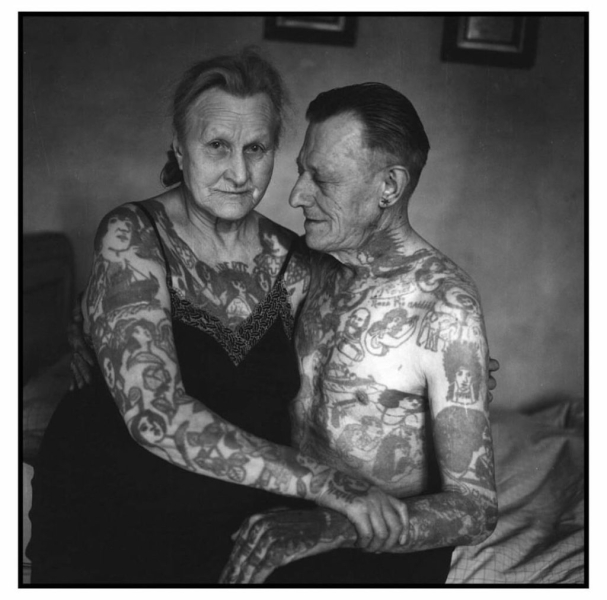
“Blue Oskar” Manischewski and his wife Emma, 1958 – Photo by Herbert Hoffmann – Source: @oldschooltattz
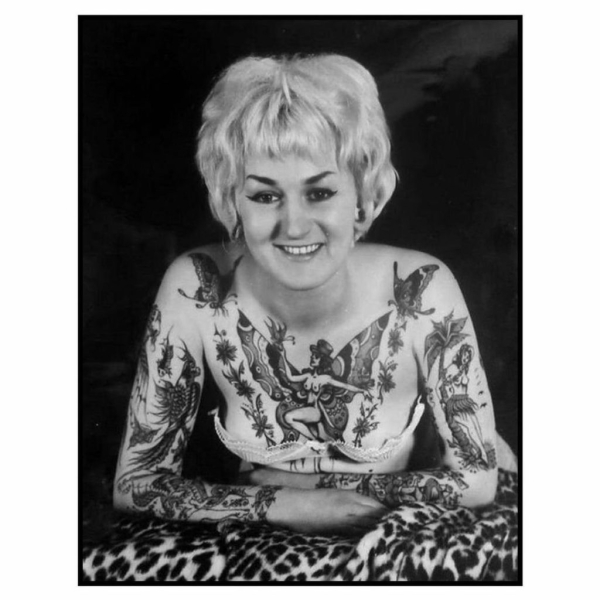
“Cindy Ray” Robinson, Australia, c.1960s – Source: @toughtimesarchive

15 year old schoolboy Eric Jarvis tattooed by Eric Simister, Featherstone, England, May, 1960 – Source: @vintagetattoophotoarchive
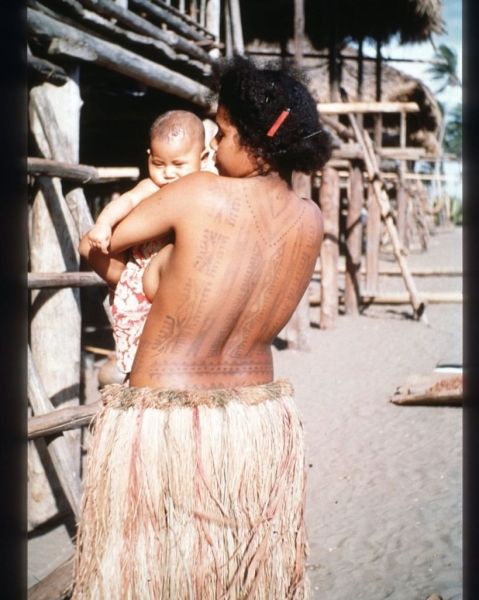
A Motuan woman and her child photographed in Manu Manu, Papua New Guinea, 1958 – Photo by Percy Cochrane – Source: @the_sea_hag
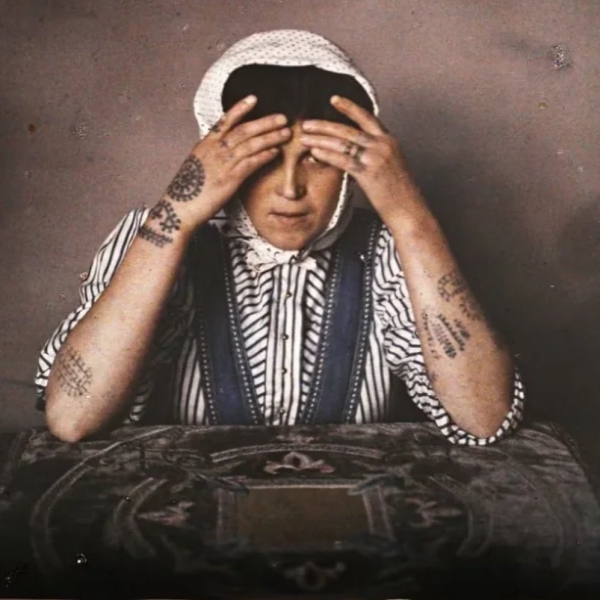
A Sarajevan Catholic woman photographed by Auguste Léon, 1912, This form of tattooing is called Sicanje or Bocanje and it is practiced by the women of Bosnia and Herzegovina – Source: @the_sea_hag

Andy Stuertz getting tattooed by Charlie Wagner, 1908 – Source: @oldschooltattz

August “Cap” Coleman 1944 – Source: @toughtimesarchive
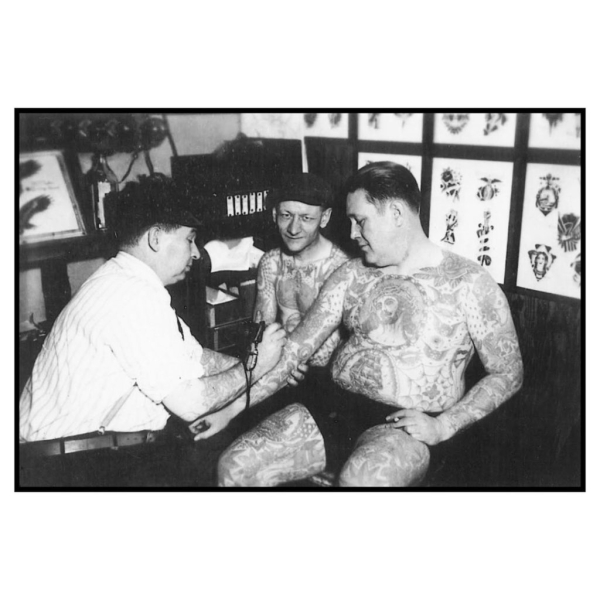
Bert Grimm, c.1940 – Source: @vintagetattoophotoarchive

Bristol Tattoo Club member tattooed by Les Skuse, c.1950’s – Source: @toughtimesarchive
From Edison’s Electric Pen to Modern Inking
Thomas Edison’s invention of the electric pen in 1876, initially designed for duplicating documents, unknowingly laid the groundwork for the modern tattoo machine.
While the electric pen itself phased out due to technological advancements, its mechanism inspired Samuel O’Reilly, an Irish-American tattoo artist, to invent the first electric tattoo needle in the 1890s. This innovation propelled tattooing into a new era of efficiency and creativity.
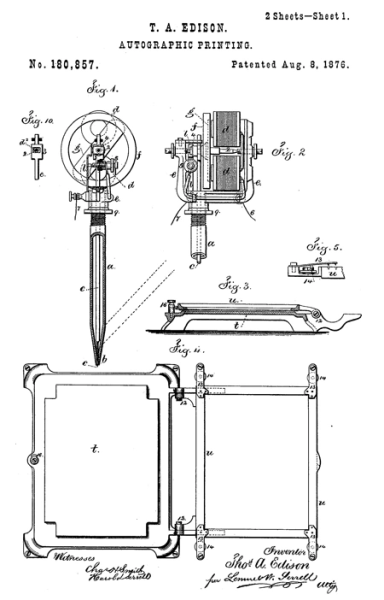
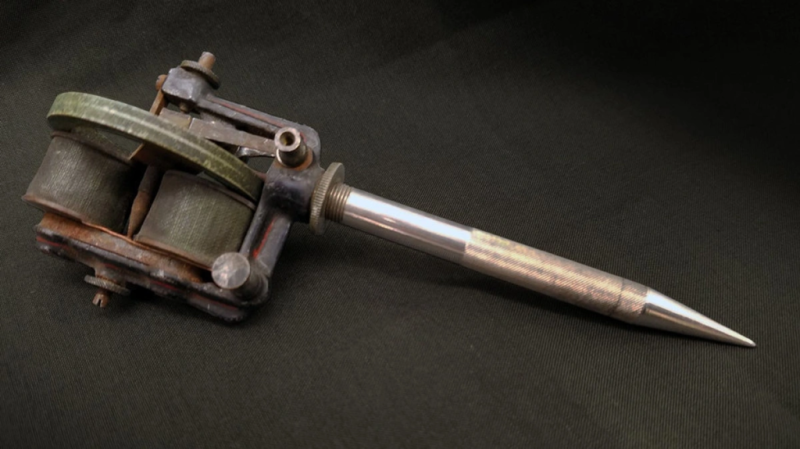
Thomas Edison’s electric pen
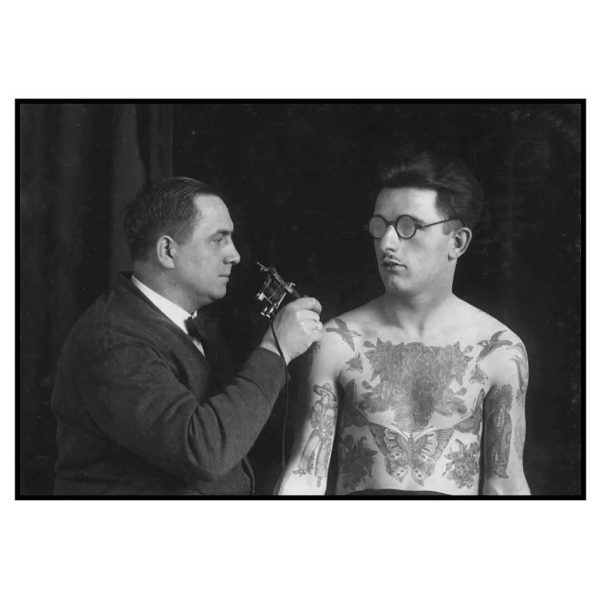
Christian Warlich tattooing Karl Oergel, Hamburg, c.1930s – Source: @toughtimesarchive
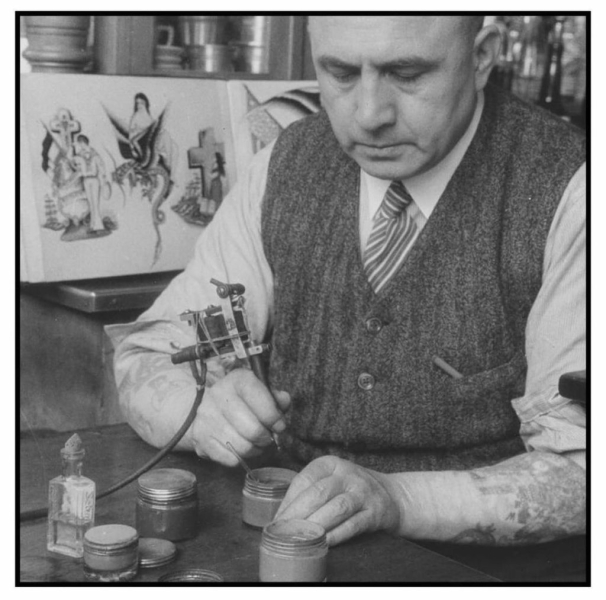
Christian Warlich, 1936 – Source: @toughtimesarchive
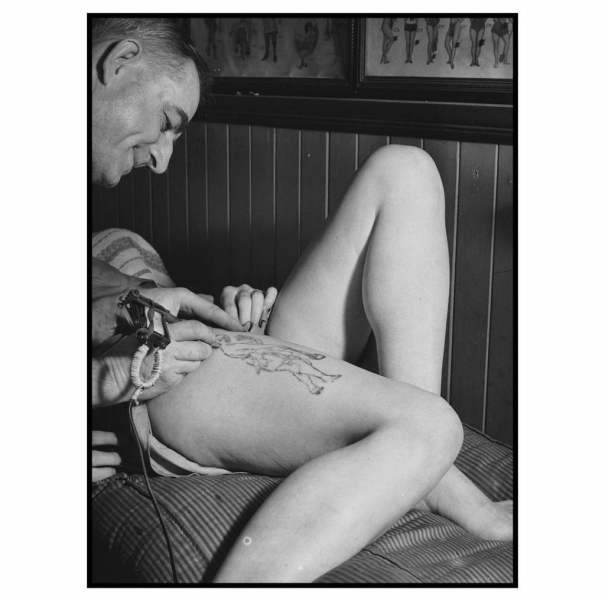
Fred Harris at work, Sydney, Australia, December 17th, 1937 – Source: @toughtimesarchive
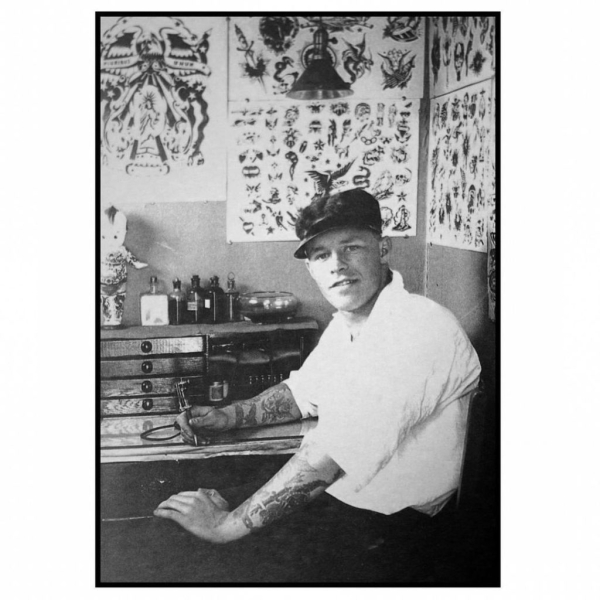
Fred Marquand c.1920s – Source: @toughtimesarchive
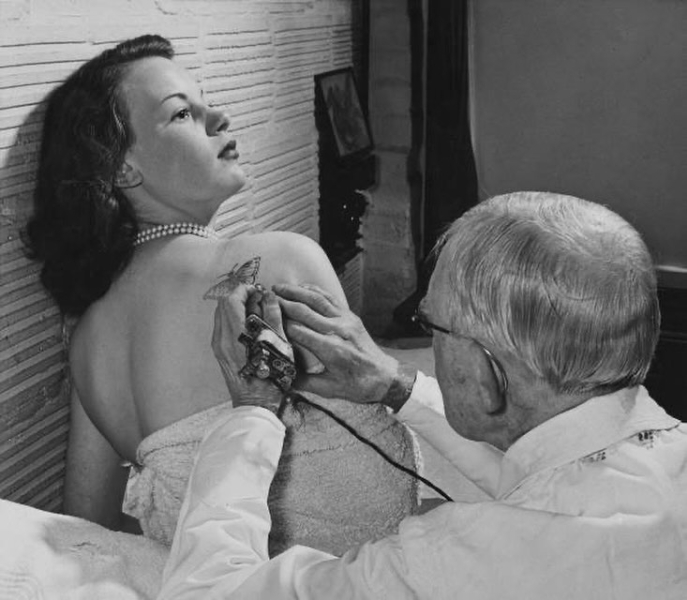
George Burchett 1935 – Photo by Peter Keen – Source: @the_sea_hag
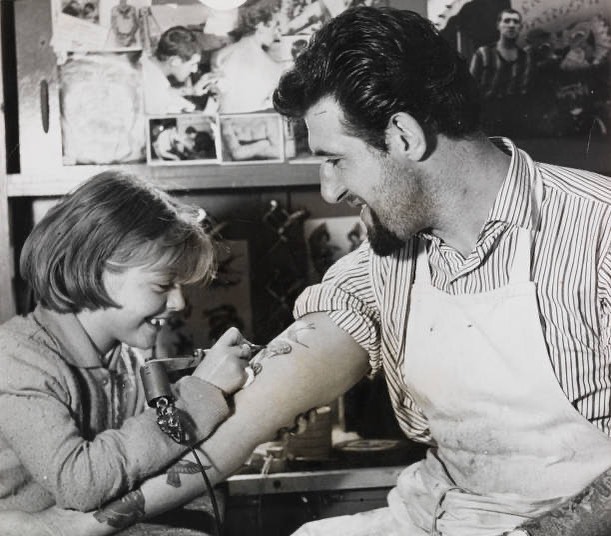
Jane Morris tattooing her dad, tattooist Darrell Morris, November 22nd 1963 – Source: @the_sea_hag
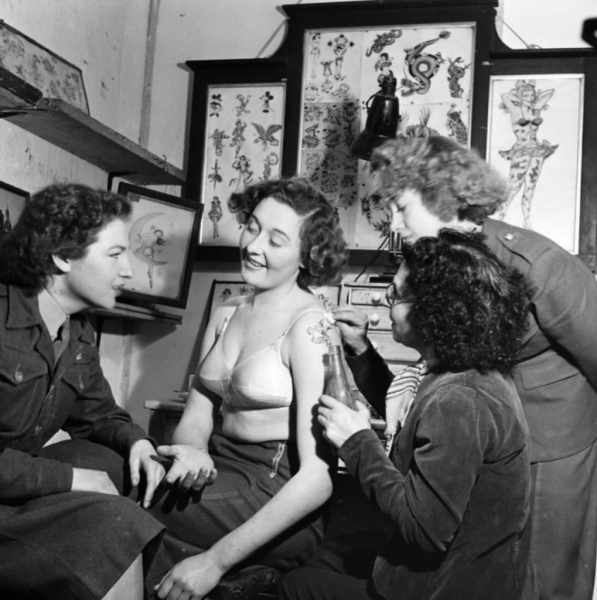
Jessie Knight tattooing a servicewoman at her studio in Aldershot, December 15th, 1951 – Source: @the_sea_hag

Joe Clingan, Detroit, Michigan, c.1950s – Source: @toughtimesarchive

Josef Martynczenak, 1967 – Photo by Herbert Hoffmann – Source: @vintagetattoophotoarchive

Les Skuse tattooing Pam Nash, 1959 – Source: @oldschooltattz
Sailor Tattoos and Nautical Symbols
Sailors were among the first groups to embrace tattoos, using them as symbols of their experiences and achievements at sea.
These markings served not only as personal talismans but also as a form of visual storytelling, chronicling journeys, milestones, and the challenges of life on the vast oceans.
Swallows indicated a sailor’s significant travel distance, while turtles signified crossing the equator. Additionally, the anchor, often accompanied by a date or a name, symbolized stability and a safe return home, grounding the sailor’s adventurous spirit to something permanent and steadfast.
These nautical tattoos, including the widely recognized anchor, remain popular today, a testament to their timeless appeal. They continue to be adorned by those who seek to capture the essence of resilience, navigation, and the deep connection between man and sea, drawing inspiration from the rich heritage of sailor tattoos.

Les Skuse, 1954 – Source: @the_sea_hag
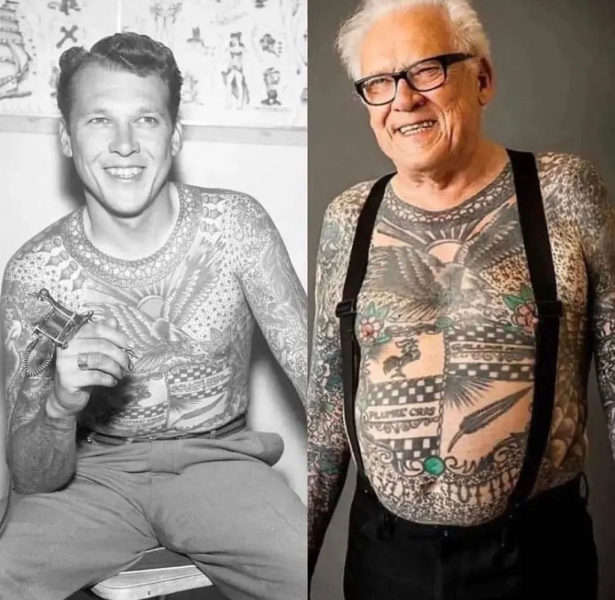
Lyle Tuttle then and now – Source: @ll3.tattoo
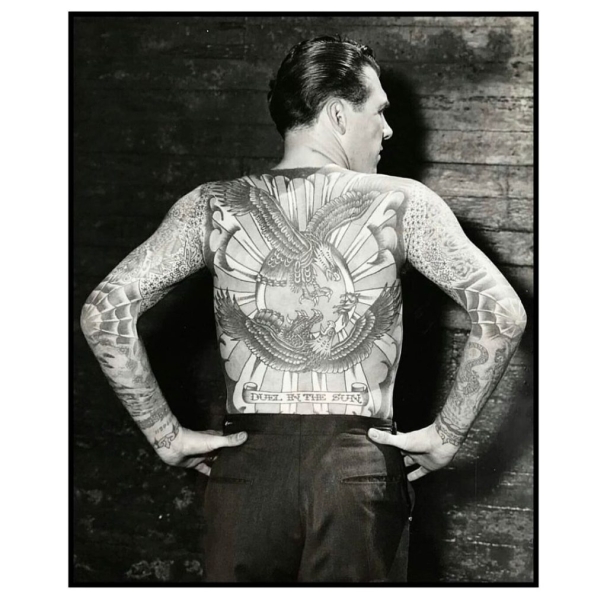
Lyle Tuttle, 1957 – Source: @toughtimesarchive
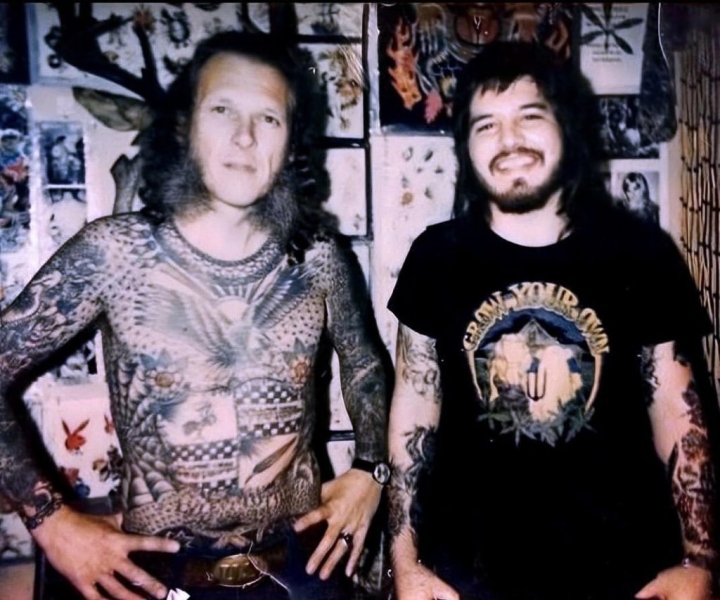
Lyle Tuttle and Marty Holcomb, c.1975 – Source: @the_sea_hag

Mack McCullen, 1956 – Source: @toughtimesarchive

Man tattooed by Pinky Yun, Hong Kong, 1962 – Source: @vintagetattoophotoarchive

Marianne and Ivor Collier tattooed by Les Skuse – Source: @the_sea_hag
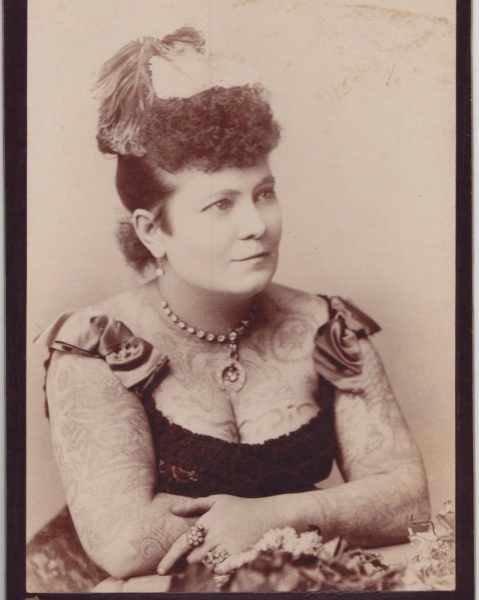
Nora Hildebrandt, c. 1880 – Photo by Charles Eisenmann – Source: @the_sea_hag

Percy Waters working on a back piece for “Dutch”, 1920 – Source: @toughtimesarchive

R.M Reynolds tattooing a sailor from the Royal Australian Navy, in his Melbourne studio, c.1940 – Source: @the_sea_hag
Patriotic Ink: A Symbol of Service and Sacrifice
For sailors and soldiers alike, patriotic tattoos served as profound emblems of honor and loyalty, transcending the mere aesthetic to embody deep personal convictions and commitments.
These tattoos, often comprising flags, emblems, or symbols representative of one’s country or military branch, were not just skin-deep decorations but declarations of a lifetime allegiance and readiness to sacrifice for the greater good.
Despite the prevailing societal reservations about tattoos, which often categorized them as rebellious or unsavory, these specific symbols of service carved out a niche of acceptance.
They bridged the gap between personal identity and collective duty, offering those in service a way to visibly carry their pride and dedication for their country, making a compelling statement of belonging and sacrifice that resonated well beyond the military community.

Ray Pearl shows Gloria Stuart her face tattooed on his chest that was done by his uncle, Hollywood, Los Angeles, California, September 2nd, 1937 – Source: @vintagetattoophotoarchive

Reg Riley, 1943 – Source: @vintagetattoophotoarchive
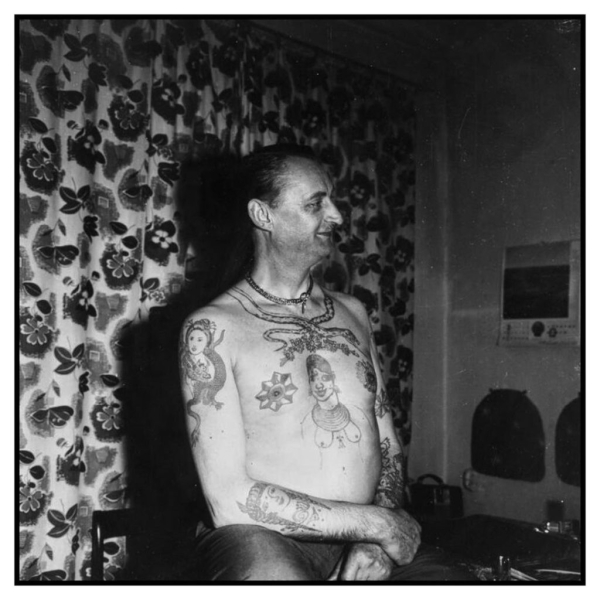
Richard Wulkow, 1966 – Source: @vintagetattoophotoarchive
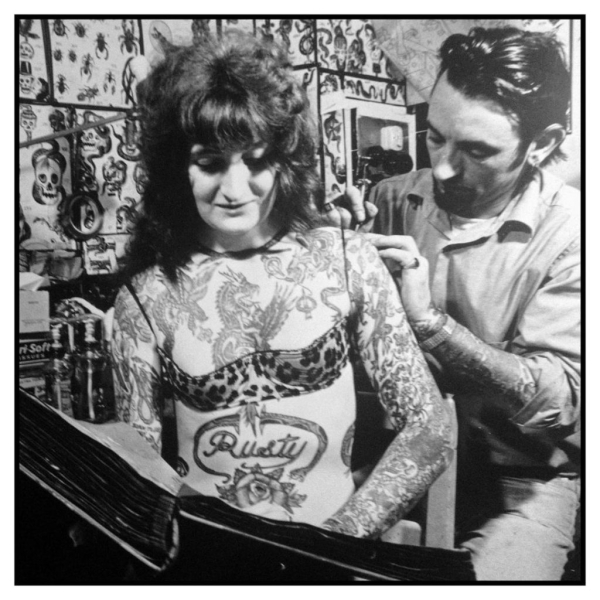
Rusty & Bill Skuse in a press photo, 1965 – Source: @vintagetattoophotoarchive

Rusty & Bill Skuse, c.1960 – Source: @toughtimesarchive
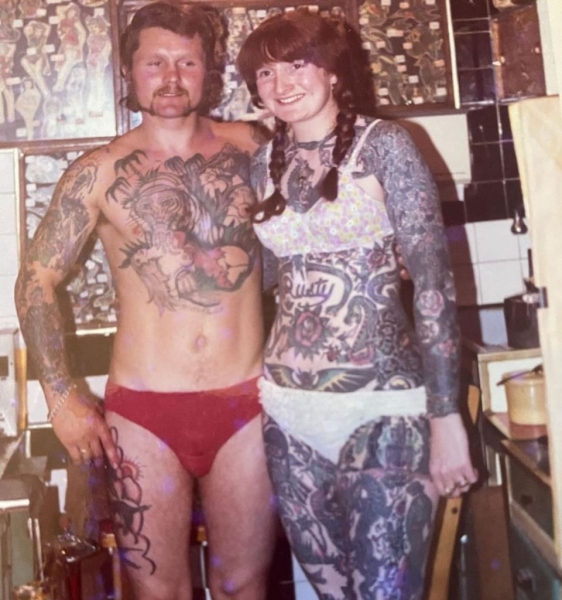
Rusty Skuse, 1960 – Source: @oldschooltattz

Sailor Ned Resinol, 1986 – Source: @vintagetattoophotoarchive

Spider Webb tattooing a bird on a woman’s shoulder outside of the Museum of Modern Art in 1976 – Source: @the_sea_hag

Tato Jack, 1954 – Source: @vintagetattoophotoarchive

Tato-Peter Petersen at work, Fiskergade, Aarhus, Denmark, 1962 – Source: @toughtimesarchive
Tattooed Circus Freaks
In the early 20th century, tattooed individuals were often part of circus acts, drawing crowds eager to witness their adorned bodies. This era’s “tattooed attractions” challenged societal norms, turning personal art into public spectacle.
Among the notable figures in the circus scene was John O’Reilly, known as “The Tattooed Irishman.” His extensive tattoos, which were considered scandalous at the time, made him a subject of fascination and controversy.
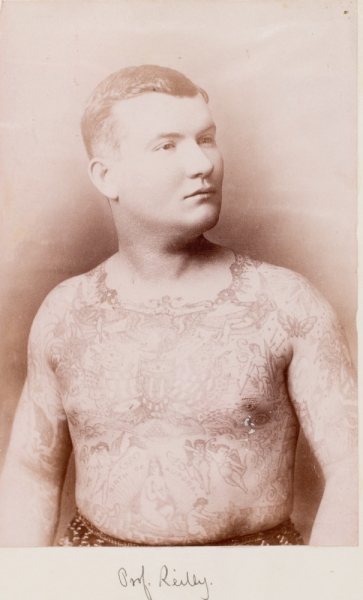
John O’Reilly, c.1880s – Source: Buzzworthy Tattoo History
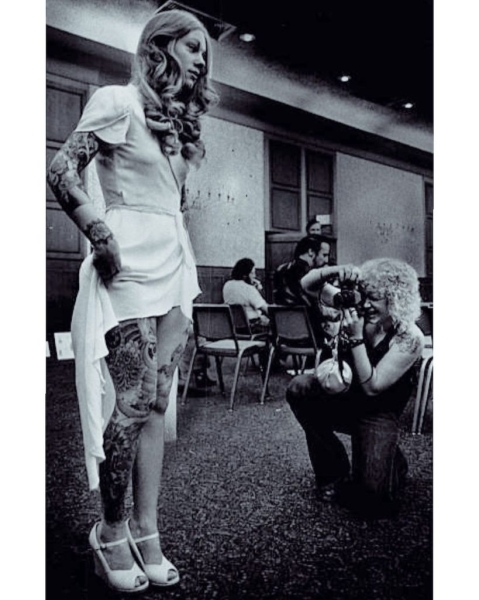
Tattooist Barbara Chapman at the Denver Tattoo Convention, March 27th, 1979 – Source: @the_sea_hag
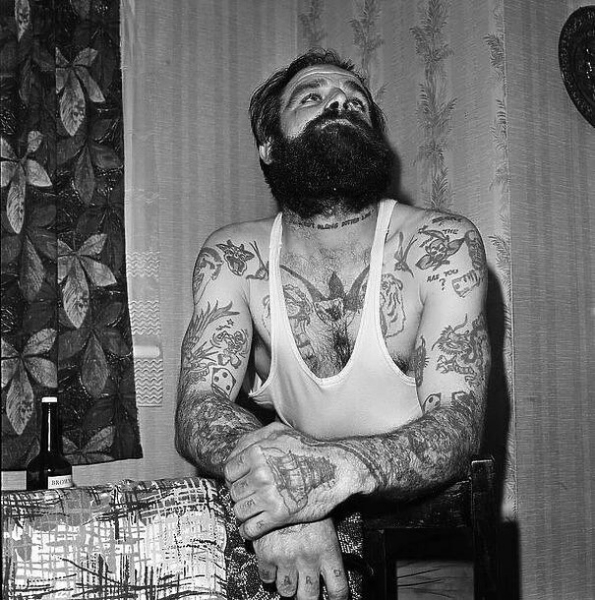
Tattooist Jack Zeek, January 1st, 1967 – Source: @the_sea_hag

Tattoos by Doc Forbes, Vancouver, British Columbia, Canada, c.1960 – Source: @toughtimesarchive
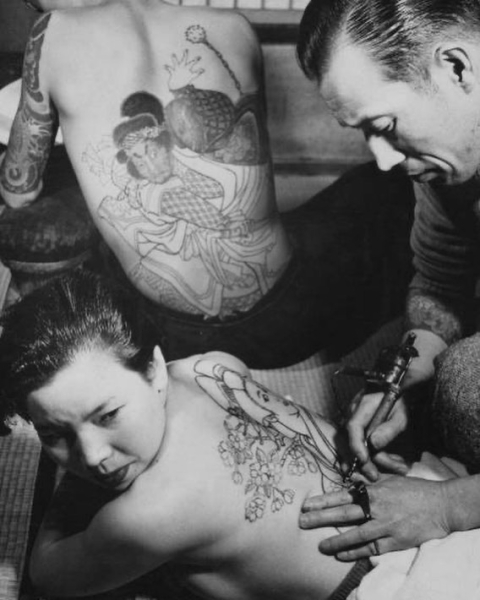
Tokumitsu Uchida (Horigorō II) working on a back piece using his self made machine, c.1955 – Source: @the_sea_hag

Tony D’Anessa tattooing his client, David King, c.1959 – Source: @the_sea_hag
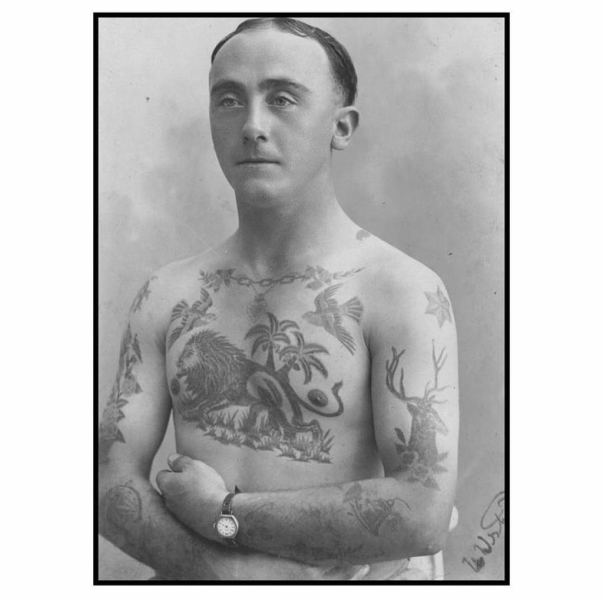
Tattooed man, c.1930 – Source: @toughtimesarchive
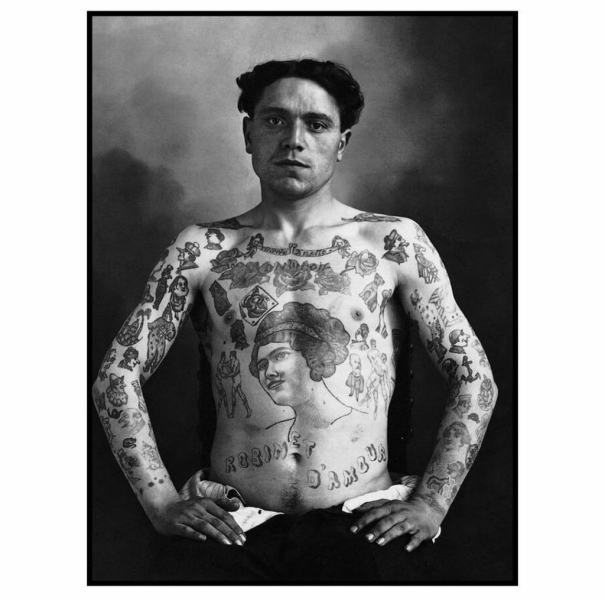
Tattooed French man, c.1950 – Source: @toughtimesarchive
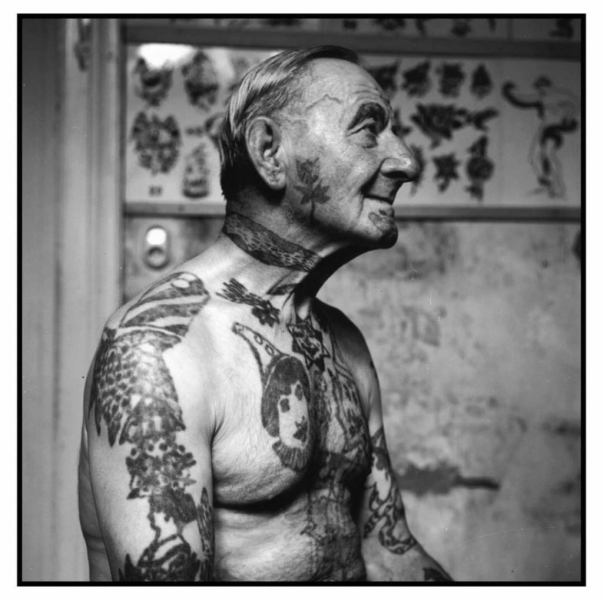
Willi Pelka, 1965 – Source: @toughtimesarchive
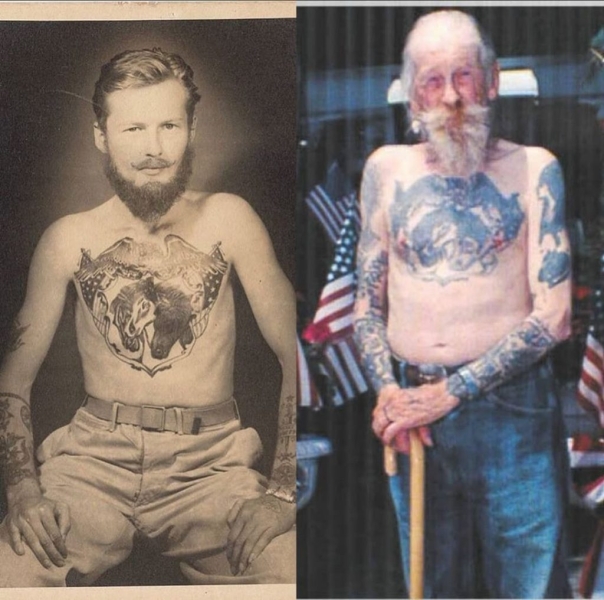
Young & old Tex Rowe – Source: @oldschooltattz
Paving The Way To Modern Tattooing
The invention of the electric tattoo machine and the culture that it sparked was the movement that helped bring us to where we are today.
This chapter sees the beginning of modern techniques which facilitate line control and gradients, qualities that are still being improved upon even today. This is also when hygiene comes into play (even if you’re also freaking out about the gloveless artist hands on most pictures!), and new standards of the practice shines a light into tattoo safety.
All in all, these pictures are definitely awesome reminders of the incredible history of tattoos, which makes us feel close to these cool tattooed folk from over a hundred years ago.
